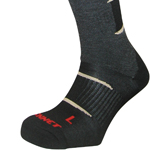Sep 26 2010
One year after the market launch by Arkema of its Rilsan 11 biosourced polyamide grade for the spinning of high performance synthetic textile fibers, the very first manufactured articles are entering the market: ski socks by Monnet, the French sports socks specialist, and a range of ultra durable luggage made from textiles by UNITIKA, a Japanese company specializing in technical fibers.
In June 2009, Arkema presented at the TECHTEXTIL tradeshow a specific grade in its Rilsan PA11 range of technical polymers derived 100% from castor oil, for extrusion into textile fibers. Just over a year later, articles made of Rilsan featuring outstanding durability are about to enter the market.

Monnet, the famous sports and outdoor socks brand, have added to its « Green Vert » catalogue a range of new sports socks made of Rilsan designed jointly with SOFILA, the French nylon yarn spinning specialist who recently developed Rilsan PA11 fibers. These ski socks are typically very soft to the touch, lightweight and very comfortable, and offer natural bacteriostatic and thermoregulating properties.Tested by many manufacturers within the textile sector, Rilsan PA11 fibers from SOFILA are soon to be used in many other hosiery brands.
In another sector, UNITIKA, a Japanese company specializing in technical fibers for garment and luggage manufacture, have contributed to the design of a new luggage range entirely manufactured from Rilsan fiber. Thanks to Rilsan 11, the outstanding characteristics of these bags include superior sturdiness and wear resistance.
With its know-how spanning over 60 years, Arkema today is the world leader in castor oil chemistry from which Rilsan PA11 has been developed, the only high performance polyamide entirely derived from a 100% renewable and ecological raw material. Rilsan PA11 production requires less fossil energy and entails lower CO2 emissions than the production of polymers of fossil origin.
On the strength of its expertise, Arkema continues its development work on its biosourced polyamide in order to target new markets in which ecological challenges and a quest for technical performance have become a genuine concern as well as a differentiating factor.